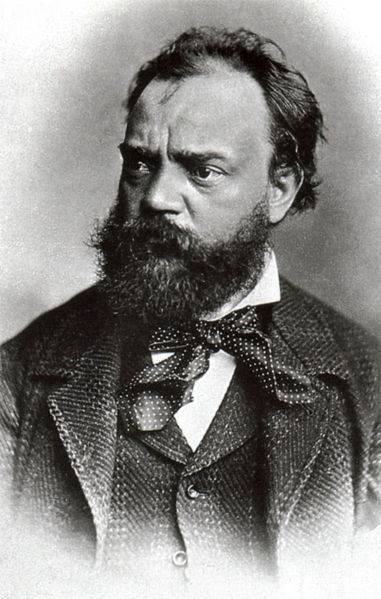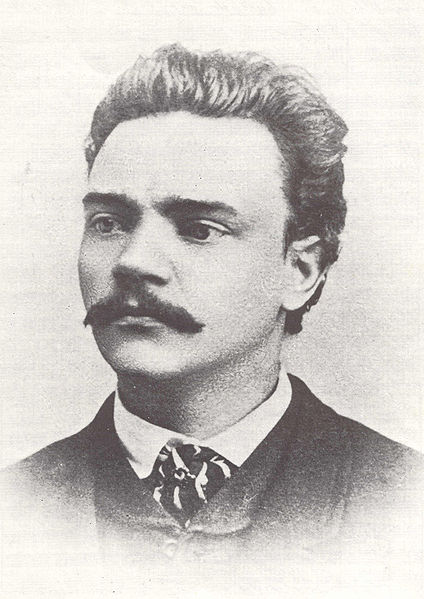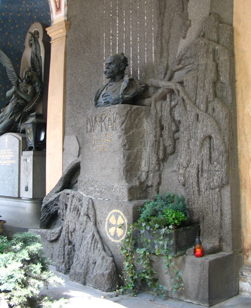<Back to Index>
- Mathematician Marin Mersenne, 1588
- Composer Antonín Leopold Dvořák, 1533
- King of England Richard I (the Lionheart), 1157



Antonín Leopold Dvořák (September 8, 1841 – May 1, 1904) was a Czech composer of Romantic music, who employed the idioms of the folk music of Moravia and his native Bohemia. His works include operas, symphonic, choral and chamber music. His best-known works include his New World Symphony, the Slavonic Dances, "American" String Quartet, and Cello Concerto in B minor.
Dvořák was born on September 8, 1841 in the Bohemian village of Nelahozeves, near Prague (then part of Bohemia in the Austrian Empire, now in the Czech Republic), where he spent most of his life. He was baptized as a Roman Catholic in the church of St. Andrew in the village. Dvořák's years in Nelahozeves nurtured the strong Christian faith and love for his Bohemian heritage which so strongly influenced his music. His father František Dvořák (1814-1894) was an innkeeper, professional player of the zither, and a butcher. Although his father wanted him to be a butcher as well, Dvořák went on to pursue a future in music. He received his earliest musical education at the village school which he entered in 1847, age 6. From 1857 to 1859 he studied music in Prague's only organ school, and gradually developed into an accomplished player of the violin and the viola. He wrote his first String Quartet when he was twenty years old, two years after graduating.
Throughout the 1860s he played viola in the Bohemian Provisional Theater Orchestra, which from 1866 was conducted by Bedřich Smetana. By the time he was eighteen years old, Dvořák was a full-time musician. He was making about $7.50 a month. The constant need to supplement his income pushed him to teach piano lessons. It was through these piano lessons that he met his wife. He originally fell in love with his pupil Josefína Čermáková, for whom he composed Cypress Trees. However, she never returned his love and ended up marrying another man. In 1873 Dvořák married Josefina's younger sister, Anna. They had nine children together, three of whom died during infancy.
It was after his marriage that he left the National Theatre Orchestra, which he had been playing in for eleven years. He secured the job of organist at St. Adalbert’s Church in Prague, which provided him with decent financial security, a higher state in social status, and enough free time to focus on composing. Dvořák composed his second string quintet in 1875, the same year that his first son was born. It was during this year that he produced a multitude of works, including his 5th Symphony, String Quintet No. 2, Piano Trio No. 1 and Serenade for Strings in E.
In 1877, the critic Eduard Hanslick informed him that his music had attracted the attention of the famous Johannes Brahms, whom Dvořák admired greatly. Brahms had a huge influence over Dvorak’s work, especially as the two later became friends. Dvořák's Stabat Mater (1880) was performed abroad, and after a successful performance in London in 1883, Dvořák was invited to visit England where he appeared to great acclaim in 1884. His Symphony No. 7 was written for London; it premiered there in 1885. Dvořák visited England nine times in total, often conducting his own works there.
In 1890, influenced by Pyotr Ilyich Tchaikovsky, Dvořák also visited Russia, and conducted the orchestras in Moscow and in St. Petersburg. In 1891 Dvořák received an honorary degree from the University of Cambridge,
and was offered a position at the Prague Conservatory as professor of
composition and instrumentation. At first he refused the offer, but
then later accepted. He probably changed his mind and accepted this
offer after quarrelling with his publisher, Simrock, over payment for
his Eighth Symphony. His Requiem premiered later that year in Birmingham at the Triennial Music Festival. From 1892 to 1895, Dvořák was the director of the National Conservatory of Music in
New York City, at a then-staggering $15,000 annual salary. The
Conservatory had been founded by a wealthy and philanthropic socialite, Jeannette Thurber; it was located at 126-128 East 17th Street, but was demolished in 1911 and replaced by what is now a high school. Dvorak’s
main goal in America was to discover “American Music” and engage in it,
as he had utilized Czech nationalist elements within his music. Shortly
after his arrival in America in 1892, Dvořák wrote a series of
newspaper articles reflecting on the state of American music. He
supported the concept that African-American and Native American music
should be used as a foundation for American music to grow from. He felt
that through the music of Native Americans and African-Americans,
Americans would find their own nationalist music. Here Dvořák met with Harry Burleigh, one of the earliest African-American composers, his pupil. Burleigh introduced traditional American Spirituals to Dvořák at the latter's request. In the winter and spring of 1893, while in New York, Dvořák wrote Symphony No.9, "From the New World". On December 15, 1893, Henry Edward Krehbiel wrote a complete analysis in the New York Daily Tribune regarding Dvořák's symphony. He spent the summer of 1893 with his family in the Czech-speaking community of Spillville, Iowa, to which some of his cousins had earlier immigrated. While there he composed the String Quartet in F (the "American"), and the String Quintet in E flat, as well as a Sonatina for violin and piano.
He also conducted a performance of his Eighth Symphony at the Columbian
Exposition in Chicago that same year. Over the course of three months
in 1895, Dvořák wrote his Cello Concerto in B minor.
However, problems with Mrs. Thurber about his salary, together with
increasing recognition in Europe — he had been made an honorary member
of the Gesellschaft der Musikfreunde in Vienna —
and a remarkable amount of homesickness made him decide to return to
Bohemia. He told Mrs. Thurbur, who still owed him his salary, that he
was leaving. Dvorak and his wife left New York before the end of the
spring term with no intention of returning. Dvořák's New York home was located at 327 East 17th Street near Perlman Place. It was in this home that the Ninth Symphony was written. Despite protests, from the then Czech President Václav Havel amongst others, who wanted the house preserved as a historical site, it was demolished to make room for a Beth Israel Medical Center residence for people with AIDS. To honor Dvořák, however, a statue of him was erected in Stuyvesant Square. After
returning home from America, Dvořák at first spent most of his
time resting and spending time with his family in the country. During
his final years, Dvořák concentrated on composing opera and
chamber music. In 1896 he visited London for the last time to hear the
premiere of his Cello Concerto in B minor. In 1897 his daughter married his pupil, the composer Josef Suk.
Dvořák was appointed a member of the jury for the Viennese
Artist’s Stipendium, and later was honored with a medal. Dvořák
succeeded Antonín Bennewitz as director of the Conservatory in Prague in November 1901 until his death from heart failure in 1904.
His 60th birthday was celebrated as a national event, with organized
concerts and even a banquet in his honor. He died from heart failure
after five weeks of illness on May 1, 1904. His funeral was on May 5.
He is interred in the Vyšehrad cemetery in Prague, under his bust by Czech sculptor Ladislav Šaloun. He left many unfinished works, including the early Cello Concerto in A major.